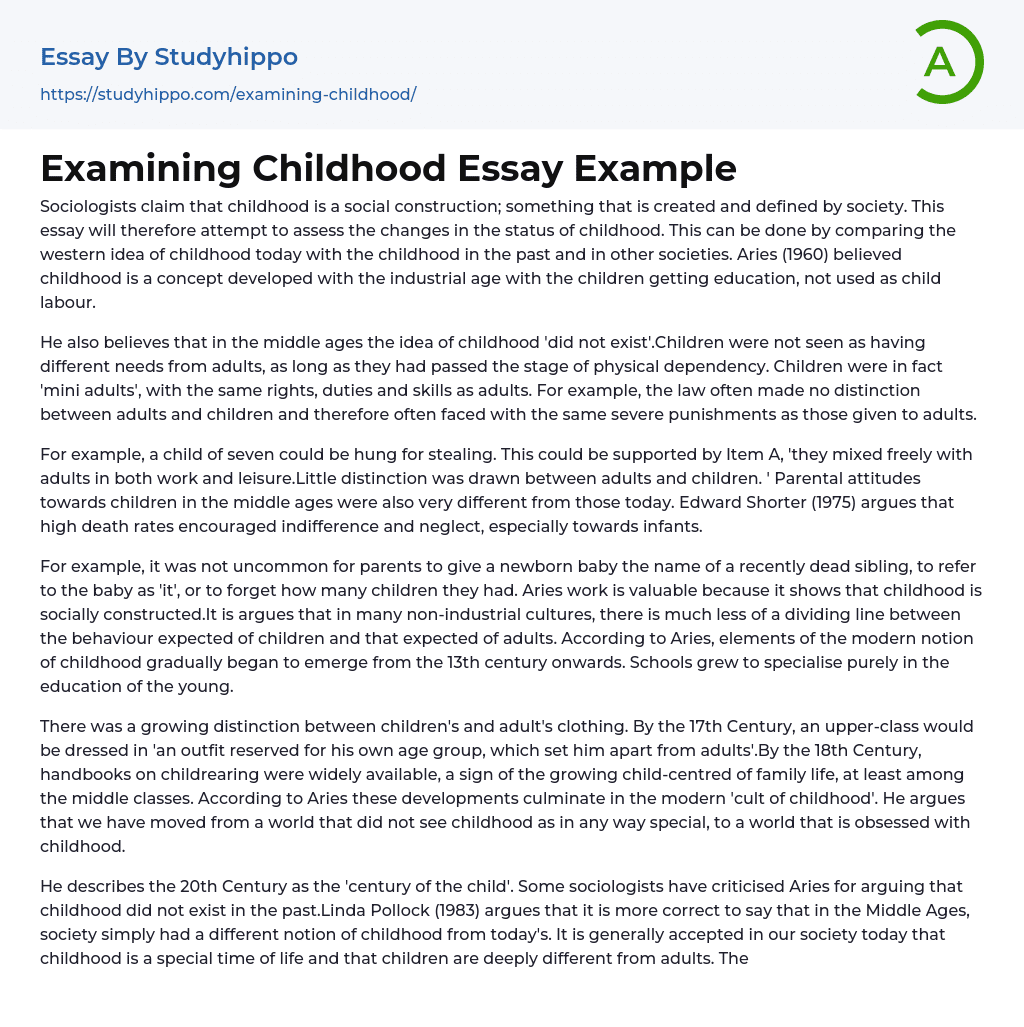As stated by sociologists, society is responsible for creating and defining childhood. The objective of this essay is to assess the progression of childhood status. In order to accomplish this task, a comparison is drawn between the modern Western viewpoint of childhood and those from different cultures and historical periods. Aries (1960) claimed that childhood emerged during the industrial era when children were educated instead of being employed in laborious tasks.
During the middle ages, children were viewed as having equivalent needs to adults and were not recognized as a distinct concept. As long as they were no longer physically dependent, they were perceived as smaller replicas of adults with corresponding rights, responsibilities, and capabilities. Consequently, due to the absence of differentiation between the two groups in the law, children frequently received severe penalties akin to those imposed
...on adults.
During the Middle Ages, theft by a seven-year-old child could result in their execution, as supported by Item A which stated that children mixed with adults in both work and leisure, without much differentiation. Parental attitudes towards children were also dissimilar to current times, as high mortality rates led to neglect and apathy towards infants, according to Edward Shorter (1975).
According to Aries, childhood is socially constructed, evidenced by practices such as giving a newborn the name of a deceased sibling, referring to babies as 'it', or forgetting how many children one has. Non-industrial cultures blur the lines between child and adult behavior. The concepts of childhood that we know today developed from the 13th century onwards, as schools became more specialized in educating youth.
During the 17th and 18th centuries, there was a noticeable distinction between clothing style
for children and adults. The upper class would wear specific outfits designated for their age group, marking them as separate from adults. As childrearing began to receive more attention and focus throughout this time period, handbooks on the subject were widely published. These developments ultimately resulted in what Aries refers to as the 'cult of childhood.' This shift reflects a move from a historical period that did not view childhood as significant to one that is preoccupied with it.
Although Aries referred to the 20th Century as the 'century of the child', other sociologists like Linda Pollock (1983) dispute his belief that childhood did not exist in past eras. Conversely, during the Middle Ages, society had an alternate perspective on childhood. Nonetheless, it is now generally acknowledged that childhood represents a unique stage of life where youngsters are viewed as physically and emotionally undeveloped and unable to handle their own affairs.
According to Jane Pilcher (1995), the modern concept of childhood emphasizes the need for children to have ample time to acquire skills, knowledge, and experience before assuming adult responsibilities. Childhood is seen as a distinct phase of life separate from adulthood, with children possessing a unique status. Neil Postman (1994) argues that societal and cultural factors, rather than biology, have contributed to shaping childhood as a social construct that has evolved over time. Additionally, attire is another way in which childhood differs from adulthood.
The notion of childhood has undergone significant transformations throughout history. Aries noted in Item A that during the Middle Ages, childhood was not clearly defined. However, Postman (1994) contends that childhood is quickly disappearing due to the prevalence of television culture replacing print
culture. This shift has led to children being given adult-like rights and engaging in activities such as smoking, drinking, and even committing crimes like murder. The pressure for children to act beyond their age is causing emotional and psychological distress within society.
Children are being pressured by society to engage in age-inappropriate activities.
- Childhood Memory essays
- Adult essays
- Aggression essays
- Altruism essays
- Archetype essays
- Behavior essays
- Certainty essays
- Conformity essays
- Deception essays
- Human Behavior essays
- Human Sexuality essays
- Maturity essays
- Morality essays
- Obedience essays
- Procrastination essays
- Reinforcement essays
- Role Model essays
- Child essays
- Child labor essays
- Childcare essays
- Adolescence essays
- Childhood essays
- Growth Mindset essays
- Individual essays
- Infant essays
- Is Google Making Us Stupid essays
- Abnormal Psychology essays
- Abraham Maslow essays
- Attachment Theory essays
- Authority essays
- Behaviorism essays
- Classical Conditioning essays
- Cognitive Psychology essays
- Counseling essays
- Developmental Psychology essays
- Educational Psychology essays
- Erik Erikson essays
- Family Therapy essays
- Jean Piaget essays
- Maslow's Hierarchy Of Needs essays
- Mental Health essays
- Operant Conditioning essays
- Personality Psychology essays
- Positive Psychology essays
- Psychoanalysis essays
- Psychotherapy essays
- Sigmund Freud essays
- Social Psychology essays
- Stanford Prison Experiment essays
- Supersize Me essays




